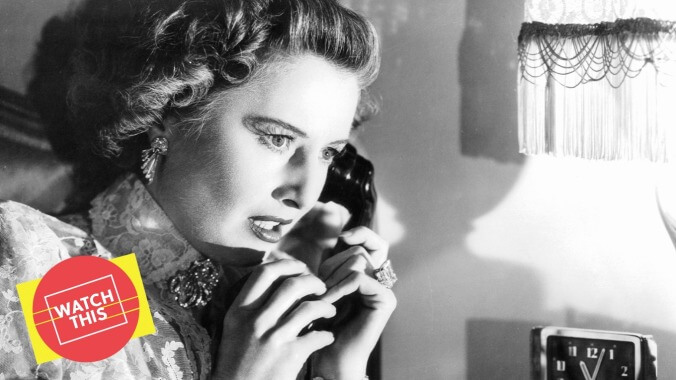Sorry, Wrong Number created the telephone horror movie

Watch This offers movie recommendations inspired by new releases, premieres, current events, or occasionally just our own inscrutable whims. This week: David Fincher’s Mank, about Herman J. Mankiewicz’s work on Citizen Kane, is coming soon to Netflix. Before it drops, check out these earlier films penned by some of Hollywood’s most famous screenwriters.
Sorry, Wrong Number (1948)
Lucille Fletcher isn’t really a household name anymore. But radio audiences in the 194os would delight whenever anthology series Suspense announced that she wrote the upcoming episode. The then-wife of composer Bernard Herrmann had a knack for crafting suspenseful half-hour dramas like “The Hitchhiker,” in which a young man traveling cross-country keeps encountering the same mysterious figure. Fletcher’s most famous script was Sorry, Wrong Number, which she reportedly wrote as an act of revenge against a wealthy woman who was rude to her at the supermarket. Orson Welles called it “the greatest radio script ever written.”
In the radio version of Sorry, Wrong Number, Agnes Moorehead voices a prickly, wealthy invalid whose only connection to the outside world is the telephone. In those days of party lines and crossed wires, she picks up the phone and overhears two men planning a murder. The circumstances described sound frighteningly similar to her own. Moorehead’s mostly one-woman show plays out as she spends the next 20-odd minutes on the phone yelling at operators and police officers and asking to speak to their managers while trying to stave off an increasing sense of impending doom. The script was so popular that Moorehead performed it on Suspense eight times; she put so much into every run-through that she was always completely destroyed afterward.
It was a natural progression for radio’s most popular script to make the leap to the movies, necessitating a blockbuster cast and an elongated rewrite from Fletcher. Barbara Stanwyck took over the invalid wife role of Leona, with Burt Lancaster as her possibly nefarious husband, Henry. (Fletcher knew from nefarious husbands; Herrmann wound up dumping her for her own cousin.) Offered a smaller role, the indignant Moorehead turned it down.
As in the original radio script, Sorry, Wrong Number is told mostly in real time, but Fletcher added a series of explanatory scenes set in the past to flesh out a backstory for her heroine and her henpecked husband. But every flashback eventually brings us back to Leona, helpless and alone in her antique-packed mansion, clinging to the phone at her bedside table as her sole method of communication. Stanwyck, then primarily known as a strong romantic lead, is a revelation as the rapidly unraveling Leona, her arrogance reduced to pleads for help from distant strangers on the phone.
Like the multitude of telephone-based horror movies that would follow—from When A Stranger Calls to Scream—Sorry, Wrong Number captures both the intimacy and the anonymity that the pre-cellular-age phone brought to remote households. Ukrainian director Anatole Litvak turned Sorry, Wrong Number into a nightmarish noir that became as terrifying to view as it was to hear over the radio: In Leona’s opulent, shadow-filled domestic cage, every bump in the night signifies her peril; every black silhouette could morph into an intruder. She desperately reaches for the faraway voice at the other end of the phone like a lifeline, knowing that it’s the only thing that could possibly save her.
Availability: Sorry, Wrong Number is currently streaming on CBS All Access. It’s also available to rent or purchase digitally from Amazon, Google Play, Apple, YouTube, and Microsoft.